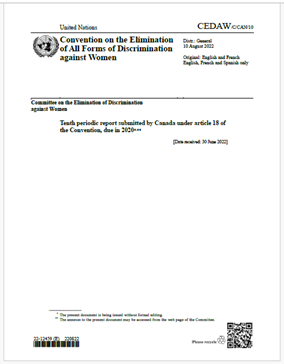Convention on the Elimination of All Forms of Discrimination Against Women (CEDAW)
As part of Canada’s international commitments, the Government periodically reports on its progress on implementing the United Nations Convention on the Elimination of All Forms of Discrimination against Women (CEDAW).
What is CEDAW

At home and abroad, Canada embraces its role as a world leader in promoting and advancing gender equality and women's rights.
In 1981, the Convention on the Elimination of Discrimination Against Women (CEDAW) was adopted as an international treaty, marking a significant advancement in the protection of women's rights. Canada ratified the Convention on December 10, 1981.
The Convention is a legally binding commitment. By ratifying the Convention, member states condemn discrimination against women in all its forms and commit to combatting discrimination against women in public and private spheres.
Departmental Responsibilities
Women and Gender Equality Canada’s Role
Women and Gender Equality Canada (WAGE) is the Government of Canada’s lead department responsible for CEDAW. WAGE is responsible for:
- Canada’s appearance before the treaty body responsible for the CEDAW, the Committee on the Elimination of Discrimination against Women
- reporting under the CEDAW, which includes preparing the federal sections of Canada’s reports and preparing for the subsequent review of Canada’s report by the CEDAW Committee
- following up with federal departments on the implementation of recommendations emanating from the CEDAW Committee
Department of Canadian Heritage’s Role
As the Secretariat to the National Mechanism for Implementation, Reporting and Follow-up (NMIRF), the Department of Canadian Heritage (PCH) is responsible for:
- the overall coordination and preparation of Canada’s reports to international human rights mechanisms, which includes incorporating provincial and territorial information
- coordinating and tracking federal, provincial and territorial follow-up and implementation of the treaty obligations and the recommendations emanating from these mechanisms
- ensuring that all recommendations made by UN human rights treaty bodies are distributed to federal, provincial and territorial governments, and to civil society and Indigenous organizations
Canada’s Tenth Report
Canada submitted its Tenth Report to the United Nations on CEDAW in 2022, which covered progress up to December 2021. This report underscored the Government of Canada's dedication to promoting gender equality and detailed important advancements in women's rights, as well as Canada’s efforts to combat global discrimination against women.
Since Canada’s last review in 2016, Federal, Provincial, and Territorial governments have adopted transformative measures, including through significant investments and legislation, to advance gender equality. Highlights include:
- creating the Department for Women and Gender Equality Act, which transformed the former Status of Women Canada agency into a full federal department, overseen by the Minister for Women and Gender Equality Canada
- introducing a Canada-wide Early Learning and Child Care system
- releasing the final report of the Employment Equity Act Review Task Force, and beginning the work to modernize the Employment Equity Act
- launching the Missing and Murdered Indigenous Women, Girls, and 2SLGBTQQIA+ People National Action Plan
- announcing the National Strategy to Combat Human Trafficking, which brings together federal efforts under one strategic framework
- establishing an open and transparent process for selecting Governor in Council (GIC) appointees
- launching the 50-30 Challenge to increase the representation and inclusion of diverse groups within their workplace
- implementing the Pay Equity Act to proactively protect pay equity working in federally regulated industries with 10 or more employees
- implementing the Canadian Gender Budgeting Act to incorporate gender-responsive budgeting into legislation
- introducing the Gender Results Framework, representing the Government of Canada's vision for gender equality
Since December 2021, Canada has developed additional policies, programs, and legislation. This includes:
- Canada’s federal, provincial and territorial government National Action Plan to End Gender Based Violence
- Canada’s first Federal 2SLGBTQI+ Action Plan
- piloting a Menstrual Equity Fund
- a detailed Action Plan to implement the United Nations Declaration on the Rights of Indigenous Peoples Act
- Changing Systems, Transforming Lives: Canada’s Anti-Racism Strategy (2024–2028)
- Action Plan on Combatting Hate
- Women Entrepreneurship Strategy
- Canada’s ratification of the International Labour Organization Violence and Harassment Convention, 2019, which came into force in Canada in January 2024 and is the first ever global treaty on ending violence and harassment in the world of work
- continued implementation of Canada’s Feminist International Assistance Policy, to secure ongoing economic and social equality for women and girls and to address the root causes of poverty
CEDAW Committee

The CEDAW Committee (Committee) is comprised of 23 independent experts on women’s rights from around the world. The appearance in front of the Committee is an opportunity for the experts to question Canada regarding its record on gender equality.
Canada carefully considers the Committee’s recommendations, recognizing the important roles that civil organizations, Indigenous partners, and human rights commissions play. This process helps Canada further improve efforts to promote and protect women’s rights.
Canada’s 2024 CEDAW Appearance
On October 16, 2024, a Canadian delegation appeared before the CEDAW Committee in Geneva, Switzerland, to present Canada’s Tenth Report and demonstrate how Canada continues to take action to advance gender equality. The delegation included representatives from Federal and Provincial governments.
Civil Society Organizations (CSOs) and Indigenous organizations submitted reports and engaged with the Committee as well, to share their perspectives on Canada’s implementation of its obligations under the Convention. Many CSOs and Indigenous organizations also attended the appearance as observers.
Canada’s 2024 appearance can be watched on the United Nations’ Web TV:
Read the meeting summary of Canada’s 2024 CEDAW appearance by the CEDAW Committee on the United Nations website.
2024 Concluding Observations
Following Canada’s 2024 appearance, the CEDAW Committee released Concluding Observations with recommendations on areas where Canada should seek to improve efforts to advance gender equality and address discrimination against women and girls, particularly for marginalized groups. The CEDAW Committee also called on Canada to submit a follow-up report within two years to address key recommendations.
On December 12, 2024, Canadian Heritage tabled Canada’s 10th Periodic Report in the House of Commons along with the Concluding Observations.
Canada is proud of its contribution to setting global norms for gender equality impacting policies and laws worldwide to eliminate gender-based discrimination globally.
Although progress on advancing gender equality has been made, more work is needed. Canada continues to implement its CEDAW obligations and is committed to further promoting policies, programs, and initiatives that advance gender equality, both at home and abroad.
Related content
- Beijing+30 and Canada’s Fifth National Review
- Convention on the Elimination of All Forms of Discrimination against Women
- Presentation of Canada's combined 8th and 9th Periodic Reports to the United Nations Committee responsible for the Convention on the Elimination of all forms of Discrimination against Women
- Human Rights
